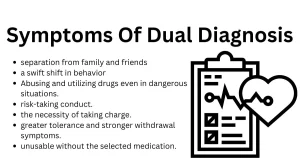Dual Diagnosis Nervous Breakdown Treatment
- Category Drugs Make You Feel Like Yourself
Dual Diagnosis Nervous Breakdown Treatment
Particularly when a person is abusing drugs or alcohol, signs of mental illness can go unnoticed. When it comes to friends and family, the signs and behaviors of substance abuse are frequently far more visible.
However, it is crucial to talk about the root causes of addiction. Is it just substance use disorder, or is there another issue at hand? To heal and live their best lives, everyone deserves to get the entire range of care.
What Is Dual Diagnosis?
When a person has both a mental illness and a substance use disorder, this is referred to as having a dual diagnosis, also known as a co-occurring disorder. Neglecting your mental condition may result in substance abuse since the two unresolved problems will start to feed off of one another. It’s crucial to deal with both problems and treat them.
People who struggle with mental illness may find themselves using alcohol or other substances as a sort of self-medication to alleviate the symptoms they are feeling. Professional researchers have, however, demonstrated that using alcohol and other substances won’t do anything but make a person’s mental illness symptoms worse.
Over 10 million persons in the United States have dual diagnoses, meaning they are dealing with both a mental illness and a substance use disorder at the same time. The following 8 symptoms and indicators can be used to determine whether a dual diagnosis is present.
Symptoms Of Dual Diagnosis
Due to the wide variety of dual diagnoses that might exist, symptoms may differ greatly. To help identify people who are at risk for drug and alcohol abuse, some mental health clinics use alcohol and drug screening tools.
Several signs of a substance use disorder could be:
- separation from family and friends

- a swift shift in behavior
- Abusing and utilizing drugs even in dangerous situations.
- risk-taking conduct.
- the necessity of taking charge.
- greater tolerance and stronger withdrawal symptoms.
- unusable without the selected medication.
Although there are other signs of mental illness than substance addiction, these are just a few. Extreme mood swings, difficulty concentrating or thinking, withdrawal from friends and social activities, and suicidal thoughts are a few possible warning signs.
It’s crucial to be aware of the warning signs, such as a sudden change in behavior, because they might approach you at any time to ask for assistance for whatever reason. The most crucial thing is never to self-diagnose, and talking to a dual diagnosis or addiction treatment specialist is crucial.
Using Drugs and Alcohol to Escape Psychological Problems
People may find themselves using medications to treat psychological issues brought on by changes in their lifestyle, such as a divorce, breakup, or even the loss of a job. They’ll discover that medications temporarily lower their stress or mask their grief.
When a person starts to sober up, they could go through anxiety and panic episodes and mentally regress to where they were before they started using. You may have a mental condition like depression if you find that the only way to cope with your emotional anguish is to use drugs and alcohol.
Mental Health Warning Signs
Depending on the kind and degree of the ailment, a mental disorder may present with a variety of symptoms. The following are some of the most typical signs of mental illness:
Adult Symptoms of Mental Illness
- Confusing ideas.
- Sad or agitated
- feelings that fluctuate in mood.
- fearful, extremely concerned, or nervous.
- socially reclusive
- different eating or sleeping patterns.
- becoming angrier frequently
- becoming unable to handle challenges and day-to-day living.
- Suicidal ideas.
- ignoring your issues
- excessive drinking and drug usage.
Signs your children or pre-teen may have a mental illness include:
- unable to handle challenges and daily life.
- different eating or sleeping patterns.
- Poor academic achievement.
- complaints about bodily discomfort.
- dread gaining weight
- Loss of appetite and even thoughts of suicide are symptoms of depression.
- Furious outbursts.
- the excessive use of drugs and alcohol.
- severing ties with friends.
It’s essential to be aware of your feelings and to write down any that you may experience that are on the list above. These are some signs that you should take note of.
History of Mental Illness
Although there is a tendency for the mental disease to run in families, the evidence for hereditary causes of mental illness is not as strong as you might think.
Although some researchers have discovered genetic roots for mental health illnesses, there isn’t necessarily a direct one-to-one relationship.
Many people who do not have a mental illness have a family member who does. Even if you don’t have a hereditary predisposition to mental illness, childhood exposure to mental illness can significantly raise your vulnerability to the disease.
Children with mentally ill parents may witness and pick up on a range of unhealthy coping mechanisms, placing them at risk for later having a mental illness.
A prior history of a documented mental illness will be a strong sign that you may require dual diagnosis treatment. Mental disease symptoms do not simply disappear on their own. You must seek the assistance of a skilled specialized mental health expert at Al-Sanabel Specialized Psychiatric Center.
There is a good chance that your life will still be affected if you have ever received a mental health diagnosis. This can be one of the factors contributing to your use of drugs as a coping mechanism for life’s stresses and anxiety.
Trying to Quit The Drug Makes You Angry, Suicidal, or Violence
Everyone finds the withdrawal process to be stressful, but the longer you use it, the more difficult it becomes. It’s common to have feelings of rage, anxiety and difficulties concentrating while detoxing. However, if you feel out of control and can no longer stand it, it might be time to seek out professional assistance. People with mental illnesses frequently experience the following withdrawal symptoms:
- Suicidal ideas.
- detrimental to you.
- dreams of upsetting past experiences.
- feeling afraid.
- extremely furious and violent toward anyone stirring up trouble.
The following are possible effects of a dual diagnosis:
- failing physical health.
- Suicide danger.
- Risk of aggression.
- Risky sexual conduct.
- not anymore using medicine.
- legal problems with the law, such as imprisonment.
- difficult partnerships.
- Home and financial stability issues.
Drugs Make You Feel Like Yourself
To relieve daily stress or to try something new, people start using drugs. But if you use drugs frequently, you’ll quickly start to believe that you need to consume drugs to feel normal. You might discover that you have a mental illness because you have now become dependent on them. Here is a list of a few medications that have an impact on various moods:
- even though various medicines can be used for self-medication, your preferred substance may shed light on the nature of your mental disease. Cocaine and meth, for instance, are frequently used by those who suffer from ADHD, depression, and seasonal affective disorder.
- People who suffer from anxiety disorders frequently use medications like benzodiazepines, which include Xanax, Ambien, and Ativan.
- People who are experiencing psychotic symptoms may find themselves switching between several different types of medications to treat their symptoms.
How Is Dual Diagnosis Treated?
An integrated intervention, in which a person receives care for both their documented mental illness and their substance abuse, is the best strategy to manage a dual diagnosis.
Your healthcare provider should explain to you how each issue will impact others and how your personalized treatment will work best for you. Some of these traditional techniques that are employed as part of the treatment process will be individualized for each treatment plan.
Detoxification
For the person’s early sobriety and safety, inpatient detoxification will typically be more beneficial than outpatient therapy. A qualified medical practitioner will keep an eye on the patient around-the-clock for up to seven days as they undergo inpatient detox. If delivering a tampered amount of the drug or its therapeutic substitute is required to decrease the withdrawal symptoms, medical professionals will make that decision.
Psychotherapy
This will make up a sizable portion of a successful dual-diagnosis treatment program. People with dual diagnoses will benefit from cognitive-behavioral therapy (CBT) in learning coping mechanisms and changing unproductive thought patterns that could lead to relapse into substance abuse.
Medications
To help people with substance use disorders manage their withdrawal symptoms while going through the detoxification process, which will support a successful recovery, some medications may be useful.
Support and Self-Help Groups
Members of support groups can express their difficulties, celebrate victories, and offer advice on how to heal. Additionally, they will arrange a get-together where you can build positive relationships with others who will support your efforts to maintain sobriety.
Supportive Housing
For people who have a dual diagnosis, there are a group or sober homes. These facilities will offer varying degrees of high-quality care from qualified professionals while also promoting freedom and support.

